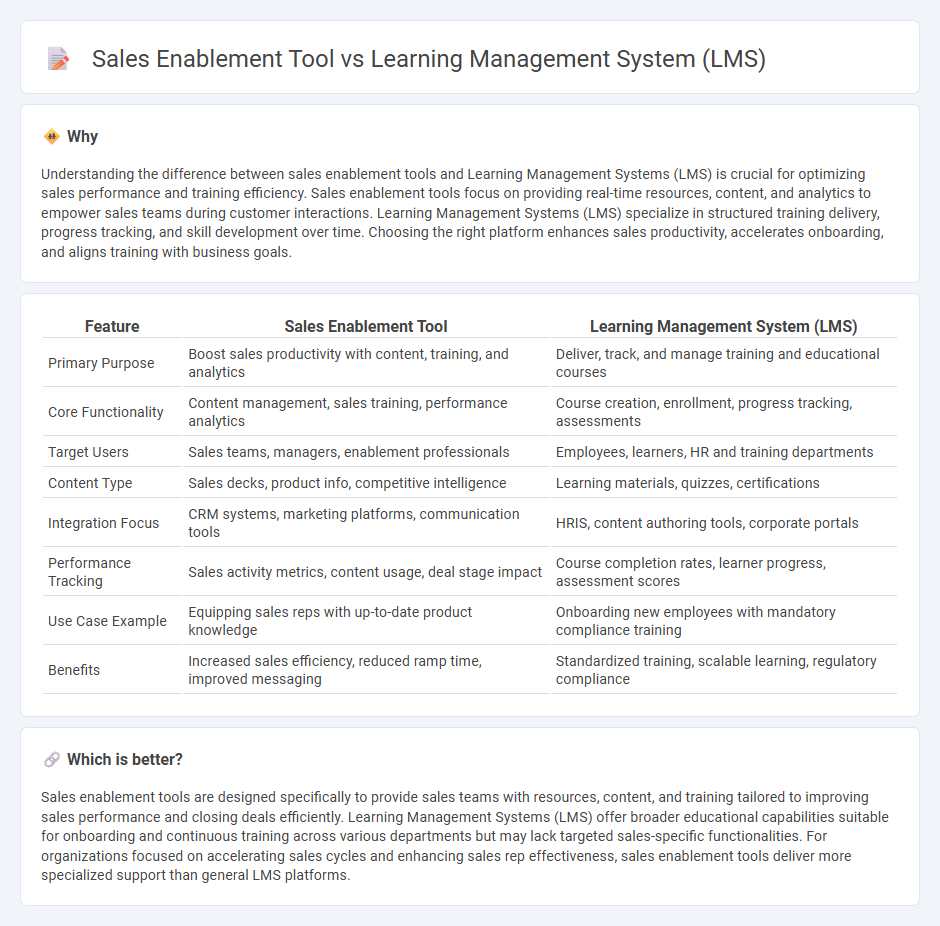
Sales enablement tools streamline the sales process by providing real-time access to marketing content, customer data, and training resources tailored for sales teams, enhancing productivity and deal closure rates. Learning management systems (LMS) focus on structured training delivery, tracking employee progress and compliance but may lack the dynamic, on-the-go support crucial for sales performance. Explore how choosing the right platform can transform your sales team's effectiveness and drive revenue growth.
Why it is important
Understanding the difference between sales enablement tools and Learning Management Systems (LMS) is crucial for optimizing sales performance and training efficiency. Sales enablement tools focus on providing real-time resources, content, and analytics to empower sales teams during customer interactions. Learning Management Systems (LMS) specialize in structured training delivery, progress tracking, and skill development over time. Choosing the right platform enhances sales productivity, accelerates onboarding, and aligns training with business goals.
Comparison Table
| Feature | Sales Enablement Tool | Learning Management System (LMS) |
|---|---|---|
| Primary Purpose | Boost sales productivity with content, training, and analytics | Deliver, track, and manage training and educational courses |
| Core Functionality | Content management, sales training, performance analytics | Course creation, enrollment, progress tracking, assessments |
| Target Users | Sales teams, managers, enablement professionals | Employees, learners, HR and training departments |
| Content Type | Sales decks, product info, competitive intelligence | Learning materials, quizzes, certifications |
| Integration Focus | CRM systems, marketing platforms, communication tools | HRIS, content authoring tools, corporate portals |
| Performance Tracking | Sales activity metrics, content usage, deal stage impact | Course completion rates, learner progress, assessment scores |
| Use Case Example | Equipping sales reps with up-to-date product knowledge | Onboarding new employees with mandatory compliance training |
| Benefits | Increased sales efficiency, reduced ramp time, improved messaging | Standardized training, scalable learning, regulatory compliance |
Which is better?
Sales enablement tools are designed specifically to provide sales teams with resources, content, and training tailored to improving sales performance and closing deals efficiently. Learning Management Systems (LMS) offer broader educational capabilities suitable for onboarding and continuous training across various departments but may lack targeted sales-specific functionalities. For organizations focused on accelerating sales cycles and enhancing sales rep effectiveness, sales enablement tools deliver more specialized support than general LMS platforms.
Connection
Sales enablement tools and Learning Management Systems (LMS) are interconnected through their shared goal of enhancing sales team performance by providing targeted training and resources. Sales enablement tools deliver real-time content, analytics, and coaching, while LMS platforms structure comprehensive, ongoing education programs tailored to sales methodologies. Integrating these systems ensures continuous skill development, knowledge retention, and data-driven adjustments to optimize sales effectiveness.
Key Terms
Training Content Delivery
Learning management systems (LMS) specialize in structured training content delivery with features like course creation, assessments, and progress tracking, designed to facilitate continuous learning and skill development. Sales enablement tools, on the other hand, provide real-time access to sales content, playbooks, and customer insights, optimizing buyer engagement and accelerating the sales process. Explore the distinctions and benefits of each platform to determine the best fit for your organization's training and sales needs.
Performance Analytics
Performance analytics in Learning Management Systems (LMS) provide detailed insights into learner progress, engagement rates, and course completion metrics, helping organizations optimize training programs effectively. Sales enablement tools emphasize real-time analytics on sales reps' knowledge application, content usage, and deal progression to accelerate revenue growth. Explore the comprehensive capabilities of both solutions to determine which aligns best with your business goals.
Sales Workflow Integration
Sales workflow integration is critical when comparing learning management systems (LMS) and sales enablement tools, as sales enablement platforms are specifically designed to align training with real-time sales activities and CRM data, enhancing sales reps' performance. LMS platforms primarily focus on employee training and compliance, often lacking seamless integration with sales processes and tools like Salesforce or HubSpot. Explore how integrating sales enablement tools can streamline workflows and boost revenue generation.
Source and External Links
Learning management system - Wikipedia - An LMS is a software application for administration, documentation, tracking, reporting, automation, and delivery of educational courses or training programs, widely adopted in higher education and e-learning, especially growing during the COVID-19 pandemic.
What is a Learning Management System (LMS)? - An LMS is a software or web-based technology used to plan, implement, and assess learning processes, providing tools for content creation, student monitoring, interaction, and assessment, used across educational institutions and enterprises.
What is an LMS (Learning Management System)? - A platform that creates, delivers, and manages educational or training programs, offering benefits such as cost reduction, real-time learner tracking, compliance management, and streamlined training and onboarding.
 dowidth.com
dowidth.com